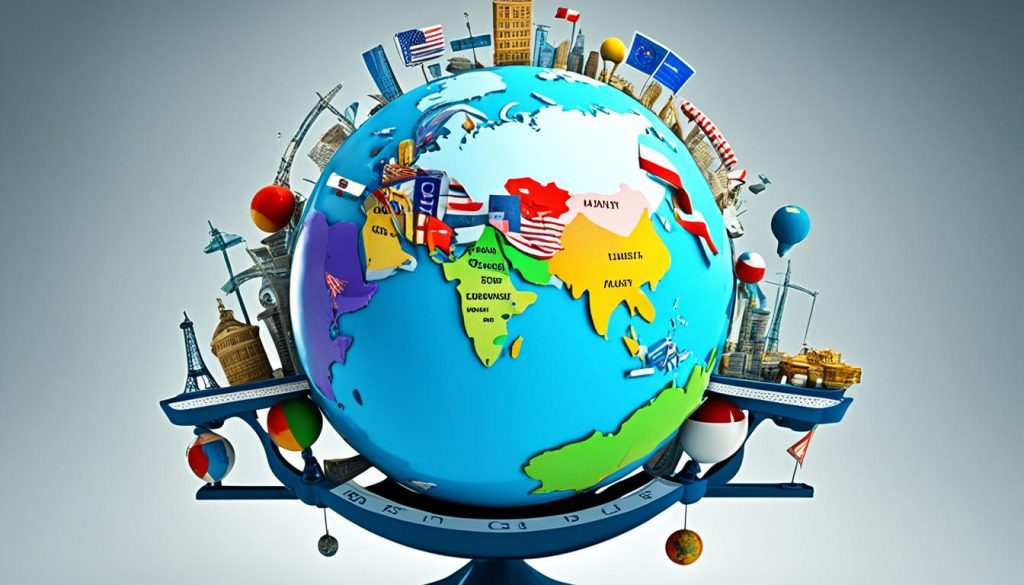In the fast-paced world of global business, challenges are everywhere. Companies, whether new or mature, face issues like changing foreign exchange rates and rising costs. Other hurdles include transaction fees and the difficulty of handling payments worldwide. It’s important to stay updated on market trends to make smart choices. This helps in reducing risks and growing sustainably. Working with a global payments partner who is adaptable and offers diverse currency options can safeguard against the uncertainties of the world market. This keeps businesses moving forward.
For successful growth in international markets, a strong global strategy is essential for start-ups. It empowers them to handle global payments confidently while smartly dealing with initial costs.
Key Takeaways
- Manage upfront costs strategically for successful global expansion.
- Partner with flexible global payments providers to mitigate risks.
- Stay informed on market insights and economic trends.
- Leverage diverse currency solutions for smoother financial operations.
- Prioritise a robust global strategy for start-ups to maintain forward momentum.
Understanding the Financial Impact of Global Market Expansion
When planning to expand globally, it’s important to consider many complexities. One major challenge is the currency fluctuation impact, which can affect profits. To reduce such risks, a detailed strategy is needed. It should identify payment partners who have global payments expertise and can quickly adjust to economic changes.
To keep profit margins safe, companies must adopt strong financial strategies. This includes:
- Setting up a diverse currency management system
- Keeping a close watch on finances
- Working with experts who understand the industry well
Becoming flexible in financial planning is key for successful global expansion. Companies need to change their financial strategies fast based on market trends. Being adaptable helps protect profits and ensures stability even when the economy is uncertain.
With the support of experienced payment partners and smart currency management, businesses can confidently grow internationally. Taking proactive steps to deal with currency changes will help increase profit margins and encourage ongoing global expansion.
Assessing Readiness for International Market Expansion

Before you expand internationally, it’s key to check if you’re ready. Look at how well your business is doing at home and if it can grow globally. It’s important to see if what works locally can also work abroad.
Gauging Domestic Performance
Start by looking at how your company is doing in your own country. Check your finances, how happy your customers are, and your market share. This information helps lay the groundwork for international plans.
Scalability and Resource Assessment
It’s crucial to see if your business can grow on a global scale. Make sure your team and systems can handle the challenges of going international. Also, think about where in the world your business could do well.
Choosing the Right Market for Expansion
Expanding internationally requires a well-planned strategy. Choosing the correct market is key. To do this well, one must analyse markets deeply. This means figuring out where your offerings are needed most. It also involves checking if your business matches the local culture. This helps ensure a smooth start in new markets.
Market Analysis Techniques
To analyse markets, businesses should use several methods. They can look at market reports, consumer feedback, and what competitors are doing. This helps them see if their products could succeed elsewhere. Also, looking at economic trends gives clues about market readiness. These steps are vital for planning how to enter new markets.
Identifying Target Markets
Finding the right markets means looking at culture and local traits. For example, similarities in shopping habits and language help a lot. UK businesses often choose Australia and New Zealand. They share cultural and linguistic similarities with the UK. This makes stepping into these markets easier and more promising.
Expanding into international markets often involves upfront costs

Stepping into international markets means lots of initial costs. These include market research, setting up operations, and making your brand fit local preferences. It’s vital to get these steps right to make your business work worldwide.
To succeed abroad, it’s key to understand and handle these costs well. Managing spending wisely is crucial. It involves knowing both clear and hidden expenses.
Getting all costs figured out from the start is necessary. This includes legal fees, making products fit for new places, and hiring the right people. With good planning and smart use of resources, companies can reduce risks. This way, they make the most of their global move.
Managing Foreign Exchange and Currency Volatility
Businesses aiming for stable overseas work must handle foreign exchange management in uncertain economies. They need strong currency strategies for global market success.
Economic Volatility and Its Impact
Economic ups and downs seriously affect firms with global operations. If exchange rates swing wildly, firms might face big money losses. So, they must understand how economic changes can affect currency risk and their profits.
Strategies for Minimising Currency Risk
To deal with currency changes, firms should work with banks that have top-notch foreign exchange tools. They also need to tailor strategies for economic ups and downs. Making use of currency tools to ease transactions and guard against bad currency moves is key for steady international business.
Securing Financing for International Expansion

Expanding a business across borders needs good planning and knowing your funding options for expansion. Companies looking at financing international growth have many ways to get the money they need. This includes venture capitalists, loans, and government grants.
Options for Funding
There are several good funding sources for businesses wanting to grow globally:
- Venture Capital: Great for new companies and tech businesses, offering both money and guidance.
- Business Loans: Banks and credit lines can give the needed funds for bigger operations.
- Government Grants: Many grants aim to help companies reach across borders.
Investment Sequences
When entering international markets, it’s crucial to plan investments carefully. Companies need to match their spending with each step of expansion. This means having enough funds for research, setting up, and starting costs. Doing it this way helps get the most from the investment and keeps growth steady worldwide.
Importance of a Focused Global Strategy
For any business wanting to do well abroad, developing a global strategy is key. This strategy looks at different cultures, economies, and rules. It also makes sure these align with the company’s main goals.
Strategic planning on a global level lets companies spot challenges and opportunities in each market. It makes entering new markets smoother. Companies like Unilever and HSBC show how good strategies lead to growth, even with the complexities of working across borders.
- Cultural Insights: Focusing on the market lets businesses adjust their products and marketing to match local tastes. This can make people more loyal to the brand.
- Economic Adaptability: With a global strategy, companies can deal better with different economic situations. This helps them take risks wisely and grab opportunities.
- Regulatory Compliance: Planning globally ensures companies follow local laws. This reduces legal problems and helps the business run smoothly in new places.
To sum up, a focused global strategy is extremely important. Businesses need to put effort into creating a strategy that allows them to understand and enter international markets well.
Building Relationships with Local Partners
For companies looking to expand, forming international business partnerships is key. Working with local partners gives businesses a deep understanding of the market. This includes insights into consumer habits, cultural differences, and rules important for entering the market smoothly.
Creating local market alliances brings many advantages. It makes distribution easier and improves marketing to fit the local audience. These partnerships help companies manage complex issues and make their operations more efficient.
Building cross-border relationships is also strategically beneficial. It builds trust and credibility in the local market. Having reliable partners eases negotiation and solves logistical problems in international trade.
Additionally, entering the market together with local partners enhances a company’s ability to adapt. It uses the partners’ reputation and networks to secure a strong position in the new market. This approach makes a business more flexible and better prepared globally.
Compliance with Local Regulations and Legal Norms
Navigating international laws is crucial for global business success. Firms must follow local laws and regulations. This avoids problems that could block their global goals.
Legal Considerations
When entering new markets, businesses must focus on legal compliance. This includes data privacy, work rules, and specific industry laws. Knowing local laws is key to follow regulations and succeed in these markets.
Working with local legal experts helps. They give detailed advice on these laws. This makes sure businesses meet all their legal obligations.
Regulatory Challenges
Dealing with laws in other countries is challenging. Legal systems differ greatly worldwide. Businesses must understand and adapt to these differences.
This includes varying consumer rights, taxes, and how companies are run. Being proactive in tackling these rules is crucial. It helps keep operations smooth and compliant globally.
Leveraging Technological Solutions for Global Operations

Companies wanting to succeed globally must embrace the latest technology. By using tech in international operations, they can make their processes better and more efficient. This improves how they work day-to-day.
Tech Integration Strategies
Putting advanced tech into action can improve how we manage things worldwide. Businesses should use platforms that help teams work together better, no matter where they are. It’s important for all parts of a business, like buying supplies and delivering goods, to work smoothly together.
- Invest in cloud-based management systems to foster connectivity and data availability.
- Adopt IoT technologies for enhanced monitoring and automation within supply chains.
- Utilise AI and machine learning for predictive analytics to anticipate market demands and supply chain disruptions.
Optimising Operational Efficiency
Using tech for efficiency isn’t just about making tasks automatic. It’s about making work smarter. With the right software, companies can cut down on mistakes and do things faster. This doesn’t just help the company. It also makes customers happier by giving them their services and goods on time.
- Deploy robotics and AI in warehousing and inventory management to optimise space and improve accuracy.
- Implement advanced ERP systems to ensure coherent management of resources and operations across different regions.
- Adopt comprehensive CRM platforms to centralise customer data and improve service delivery.
In conclusion, using the latest tech is key for businesses working globally. It helps them deal with the challenges of managing operations worldwide. By adopting new technologies, companies can grow and keep up in competitive markets.
Cultural Adaptation for Global Branding
In the world of global business, knowing and respecting cultural differences is key. Companies must tailor their brands and messages for local people. This makes a brand trustworthy and relevant everywhere.
Understanding Cultural Nuances
First, brands need to learn about the cultures they’re entering. This means looking into local customs, values, and what people buy. Using focus groups and surveys helps understand these differences. For example, a brand might learn that certain colours or symbols are very important locally.
Adapting Marketing Messages
After understanding local cultures, brands must make their messages fit. This means not just translating words, but also changing how they talk and what images they use. Brands like Coca-Cola and McDonald’s do this very well. They adjust their ads to connect with every culture they meet. This way, their marketing is not only clear but also liked and supported by local people.
Optimising Supply Chains for Global Expansion
For companies going global, it’s crucial to get the supply chain right. They need to tackle logistical problems and set up effective production networks. This is key to their success abroad.
Logistical Challenges
International logistics are complicated. Businesses face changing shipping costs, different rules in each country, and delays. They need clever solutions to keep the supply chain smooth.
- Implementing local manufacturing hubs to reduce transportation costs and lead times.
- Leveraging advanced technology to track and predict potential disruptions in the supply chain.
- Collaborating with reliable logistics partners who understand regional intricacies.
Creating Efficient Production Networks
A good global logistics plan involves making production networks efficient. This means looking at how each location can produce consistent, high-quality goods to meet demand.
- Assessing production facilities to ensure they meet global standards and capabilities.
- Integrating production data across all locations for better management and coordination.
- Standardising manufacturing processes to maintain product consistency and quality worldwide.
To do well globally, focusing on supply chain optimisation is essential. Businesses must build strong production networks and solve logistical problems. This will help them succeed internationally.
Developing a Localised Marketing Strategy
Starting international expansion needs a localised marketing strategy. It’s not just about translating content. It’s about shaping your marketing to deeply connect with local audiences. This means understanding each region’s culture, society, and economy. Then, adjust your brand messages for these unique areas. Using local marketing techniques helps match your message with local consumer habits. This improves your brand’s acceptance and engagement in new areas.
Make sure to use digital platforms well for international market positioning. Create marketing campaigns specific to each region. These should use the local language, sayings, and cultural references. Working with social media influencers who are popular locally can boost your campaign’s relateability and reach. Adapting your marketing for global audiences can help build a loyal customer base that feels understood and appreciated.
It’s also crucial to know how people like to buy things and what they prefer. This includes the products or services you offer. But also, how people like to learn about them and buy them. Making your digital content suit these preferences can make your marketing more successful. As you tweak your marketing for different regions, always collect feedback and check the data. This helps you keep improving and stay relevant in diverse markets.











